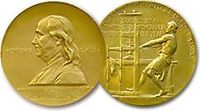Here is my first post for The Pulitzer Project and the book I read, The Known World, is the first of a couple of books I’ll be reading for Bookleaves that are winners of this prestigious prize. Edward P. Jones won the Pulitzer for this novel back in 2004, I must say I haven’t been too keenly aware of these winners but for the most part I’ve at least heard of the books that have one. The Known World is a novel I haven’t heard of until Liz mentioned it for a book club selection.
After getting a hold of the book I was really cautious because of the subject matter and it’s one of those books that just looks like it’ll be a difficult ready. I mentioned in a previous post that I was expecting this to be a challenging book but once I got going on it I was surprised. I found that I really enjoyed reading the book and wanted to read more. I was a little disappointed when it came to an end because I wanted more. There were a few shocking moments in the novel as well, and I always love a book or film that jolt me every once in a while.
The first instance I was a little overcome by the book was the constant use of the word “slave” and the big “N” word. My University training really instilled in me the importance of inclusive language and to be very aware of the words that I use. So, I really have gotten used to not having words like that around me. When they were said the first couple times I was able to look past it but when they kept coming up it was difficult to just keep going. I found it a little over used at first but then the frequency of the word declined as the book progressed…or was it that I just became accustomed to the words? I must say that I understand that the vocabulary comes from the time frame of the book (mid to late 1800’s). It was because of this that I was able to continue reading the book, if it was gratuitous use of the word – just used for shock value – I wouldn’t have been able to finish the book.
I had an encounter with language issues in University when I directed A Man for All Seasons. I was approached by one the then three presidents questioning why I didn’t remove the curs words from the script (I attended Canadian Mennonite University). I explained that I understood why some of the more conservative supporters of the school would take issue with this but I feel the language wasn’t gratutious and that it is also important to hold true to the playwrights words. So, I’ve been confronted by the issue of the power words can have. There are times I can over look it (I’m not sure that’s the right phrase to use) but there are also times the language is used to add shock to the work and that I generally don’t accept.
The second point that surprised me, and this maybe even more than the first point, was the frank discussion of freed African-American’s owning slaves. I’m sure it happened but I’ve never been confronted with this fact before and all I could think was, “Why would someone that has been freed want to put another person through the same trials and tribulations they had to?” I’m not really sure how to answer that question, and I’m still taking sometime to process it.
I can easily see why some people could have difficulty enjoying, or even getting into, the novel. But I would also encourage anyone that picks up the book to really push through the first few chapters. It gives an interesting perspective to years prior to the civil war. The slave trade was a business like any other, it’s difficult to even put those words on the screen, and The Known World gives a glimps into the business like you wouldn’t have seen before. It should be a rather lively discussion tomorrow at the book club meeting.
I would be interested to hear what others have to say about this book, if you’ve read it or tried to read it. I’d also like to hear if there are any books you’ve read that gave you an awakening of some kind, made you really think or brought a point to a subject you never thought of before.
